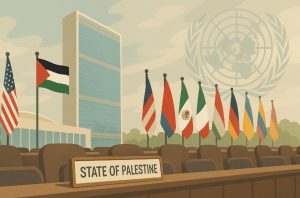Why is the State of Palestine not fully recognised as a sovereign nation, despite the fact that over 75% of the United Nations member states officially support its statehood? Why is its status still limited within the UN system? These questions have puzzled observers of the Israeli Palestinian conflict for decades.
The answers lie in the intersection of international diplomacy, unresolved territorial disputes, and the strategic use of veto powers by global superpowers.
When Did Palestine Declare Statehood?
The Palestinian quest for formal statehood began in earnest on 15 November 1988, when the Palestine Liberation Organization (PLO) unilaterally declared the establishment of the State of Palestine.
This declaration covered the territories of the West Bank, including East Jerusalem, and the Gaza Strip, which are broadly recognised as part of the Palestinian territories under international law.
Following the declaration, there was a wave of international recognition. By the end of 1988, 78 countries had recognised Palestine, reflecting a strong level of support primarily from the Global South, the Arab League, and non-aligned nations.
However, the declaration did not translate into actual sovereign control on the ground, as the territories remained under Israeli occupation or administration.
What Is Palestine’s Current Status at the United Nations?

Palestine’s formal status within the United Nations system is that of a non-member observer state, a designation granted by the UN General Assembly in November 2012 following a vote in which 138 countries were in favour.
This marked an important symbolic and diplomatic win for Palestinians, providing them with the ability to join treaties and international bodies such as the International Criminal Court (ICC) and UNESCO.
Despite this, Palestine remains excluded from full UN membership. The primary reason is the opposition from the United States, which holds permanent member status on the UN Security Council and exercises veto power.
The U.S. has consistently blocked or threatened to block any move to grant Palestine full member state status, arguing that such recognition should come only through a negotiated settlement with Israel.
What Was the Role of the Oslo Accords?
In the early 1990s, the Oslo Accords were seen as a potential path to peace and Palestinian statehood.
These agreements, signed in 1993 and 1995, were negotiated between Israel and the PLO and resulted in the creation of the Palestinian Authority (PA), a temporary governing body tasked with limited self-rule over parts of the West Bank and Gaza Strip.
The Oslo framework was meant to lead to a final agreement, including borders, Jerusalem, and the return of refugees.
However, after the assassination of Israeli Prime Minister Yitzhak Rabin and the subsequent rise of Benjamin Netanyahu, a more conservative leader less favourable to concessions, the peace process began to unravel.
Talks stalled, trust eroded, and the Palestinian leadership shifted its strategy toward seeking international recognition, bypassing Israeli consent.
Who Has Recognised the State of Palestine?
A substantial majority of countries around the world recognise the State of Palestine. As of March 2025, 147 of the 193 UN member states have formally acknowledged Palestine as a sovereign state.
These include most countries in Asia, Africa, South America, and parts of Eastern Europe. In contrast, many Western and G7 countries continue to withhold formal recognition.
G20 Countries: Recognition Overview
The G20, a forum of the world’s largest economies, is split on the issue:
| Countries That Recognise Palestine | Countries That Do Not Recognise Palestine |
| Argentina, Brazil, China, India, Indonesia | Australia, Canada, France*, Germany, Italy |
| Mexico, Russia, Saudi Arabia, South Africa | Japan, South Korea, United Kingdom, United States |
| Turkey, Spain (permanent invitee) |
*Note: France has publicly committed to recognising Palestine by September 2025, indicating a possible shift in policy among some Western countries.
While the countries in the second column have not yet recognised Palestine, many of them support the concept of a two-state solution and provide financial aid and diplomatic support to the Palestinian Authority.
However, they argue that recognition should result from bilateral negotiations between Israel and the Palestinians not unilateral declarations.
Has the International Criminal Court Recognised Palestine?

Yes, the International Criminal Court (ICC) accepted Palestine as a state party in December 2014, allowing it to join the court and file cases.
This decision, however, was made without prejudice meaning it does not constitute a final ruling on Palestine’s statehood under international law.
The ICC’s acceptance allowed Palestinian authorities to file war crimes allegations and seek legal redress, adding a new dimension to their diplomatic and legal strategy.
Still, the move was met with strong opposition from Israel and its allies, particularly the United States, who argued that Palestine was not yet a recognised state and therefore lacked the standing to initiate such legal actions.
Why Is the United States Blocking Full UN Membership?
The United States plays a pivotal role in preventing Palestine’s full UN membership. As a permanent member of the Security Council, the U.S. has the power to veto any resolution granting full statehood to Palestine.
The official U.S. position remains that final-status issues, including statehood, must be resolved through direct negotiations with Israel.
Washington has also argued that unilateral recognition could inflame tensions, derail peace talks, and undermine its role as a mediator.
This position has remained largely consistent across Republican and Democratic administrations, although the level of engagement with Palestinian leadership has varied.
Resource: https://en.wikipedia.org/wiki/International_recognition_of_Palestine






